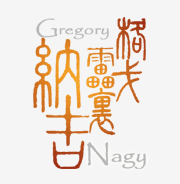纳吉教授近期主持和参与的主要科研项目
[本栏目的基本信息尚待翻译]
(Prof. Gregory Nagy has been presiding over or participating in the CHS key projects: a selection)
[the basic information of this column need to be translated]
HOMER & THE PAPYRI
[荷马与纸莎草纸文献]
Homer and the Papyri, first created by Professor Dana Sutton of the University of California, Irvine, is here published in a second electronic edition. The new edition consists of a fully searchable relational database of Homeric papyri.
Homer & the Papyri Editors and Advisors
Editor in Chief: Gregory Nagy, Director of the Center for Hellenic Studies
Editors: Casey Dué, Mary Ebbott, John Lundon, Dimitrios Yatromanolakis
Senior Advisors: Graeme Bird, Gordon College; Kathleen McNamee, Wayne State University; Dana F. Sutton, The University of California, Irvine (Editor Emeritus).
Read Information on the Present Edition
Read the Introduction to the Previous Web-based Edition of Homer and the Papyri
Read the Letter from Gregory Nagy to Dana Sutton, which created the present edition of Homer and the Papyri
The Homer Multitext
【荷马多重文本】
· Casey Dué & Mary Ebbott, Editors
· Christopher Blackwell & Neel Smith, Project Architects
· Douglas Frame, Leonard Muellner, & Gregory Nagy, Associate Editors
· A Publication of the Center for Hellenic Studies of Harvard University, G. Nagy, Director, with support from the University of Houston’s High Performance Computing Group.
About the Homer Multitext
The Homer Multitext seeks to present the textual transmission of the Homeric Iliad and Odyssey in a historical framework. Such a framework is needed to account for the full reality of a complex medium of oral performance that underwent many changes over a long period of time. These changes, as reflected in the many texts of Homer, need to be understood in their many different historical contexts. The Homer Multitext provides ways to view these contexts both synchronically and diachronically.
The Homer Multitext is a long-term project emphasizing collaborative research (we are particularly interested in undergraduate research), openly licensed data, and innovative uses of technology.The Homer Multitext welcomes collaboration in the form of diplomatic editions, images of historical documents, and translations. All material must be openly licensed and attribution will be given to the contributors. Please contact Casey Dué (casey@chs.harvard.edu) and Mary Ebbott (ebbott@chs.harvard.edu).
The Derveni Papyrus: An Interdisciplinary Research Project
【德尔维尼纸莎草纸文献:跨学科研究项目】
Editors : Leonard Muellner, G. Nagy, Ioanna Papadopoulou
Information Architects: Saïd Esteban Belmehdi, Julien Razanajao, François Recher.
Over the last 45 years the text of the Derveni Papyrus has undergone extensive reconstruction and study. Theokritos Kouremenos, George M. Parássoglou, and Kyriakos Tsantsanoglou have been among the leaders of this effort, publishing an authoritative text of the papyrus along with extensive commentary in 2006 (Casa Leo S. Olschki, Firenze).
Classics@: An Online Journal
【古典学在线学刊】
Classics@, edited by a team working for the Center for Hellenic Studies and headed by Gregory Nagy and James O'Donnell, is designed to bring contemporary classical scholarship to a wide audience on the World Wide Web. Each issue will be dedicated to its own topic, often with guest editors, for an in-depth exploration of important current problems in the field of Classics. We hope that Classics@ will appeal not only to professional classicists, but also to the intellectually curious who are willing to enter the conversation in our discipline. We hope that they find that classical scholarship engages issues of great significance to a wide range of cultural and scholarly concerns and does so in a rigorous and challenging way.
Each issue of Classics@ is meant to be not static but dynamic, continuing to evolve with interaction from its readers as participants. New issues will appear when the editors think there is good material to offer. Often it will emphasize work done in and through the Center for Hellenic Studies, but it will also call attention to fresh and interesting work presented elsewhere on the web. It stresses the importance of research-in-progress, encouraging collegial debate (while discouraging polemics for the sake of polemics) as well as the timely sharing of important new information.

· 国际史诗研究者档案 ·
Archive for International Epic Researchers





